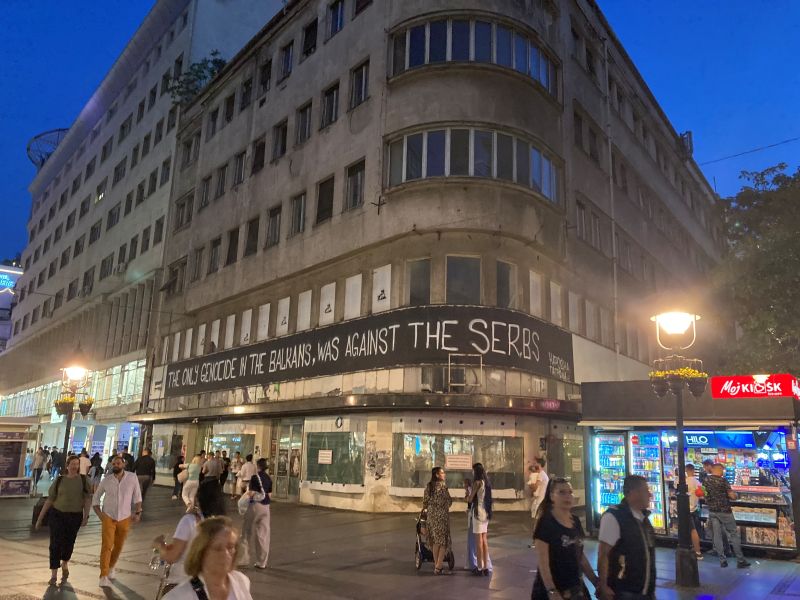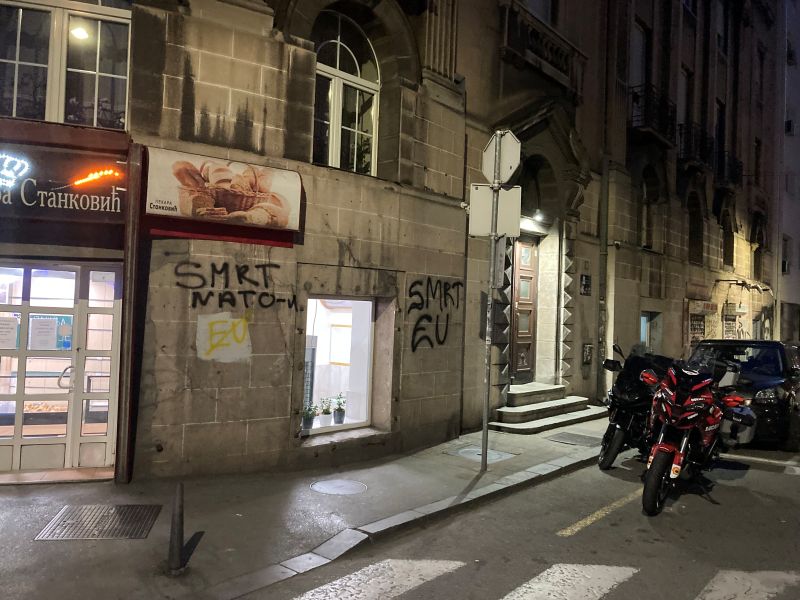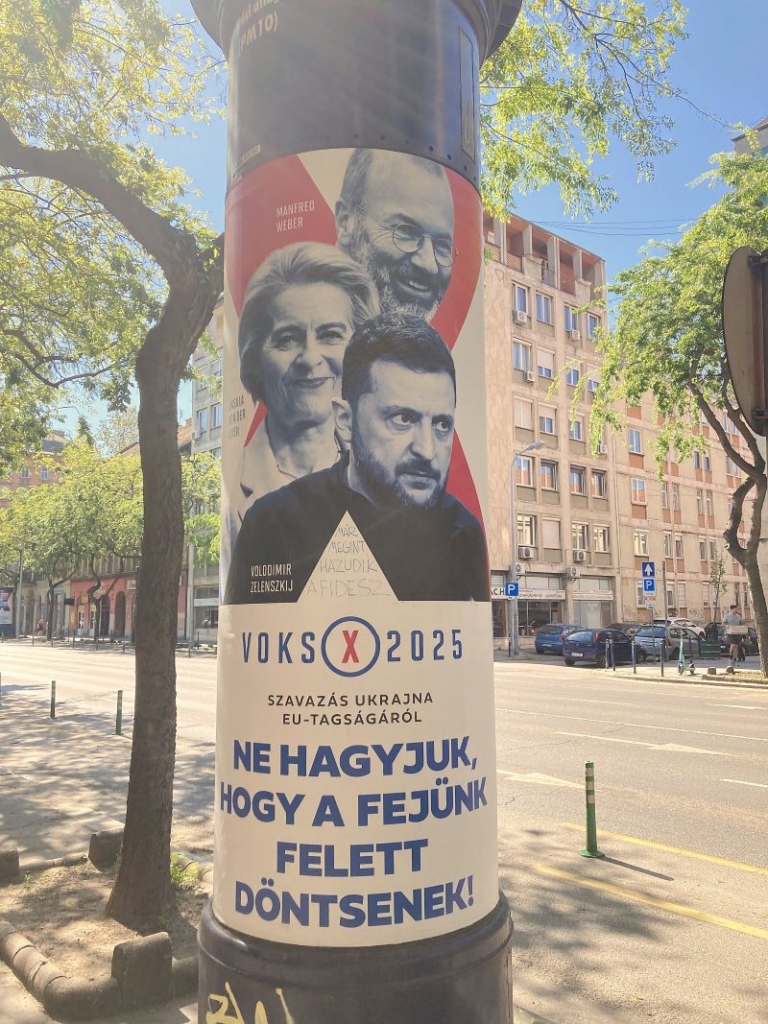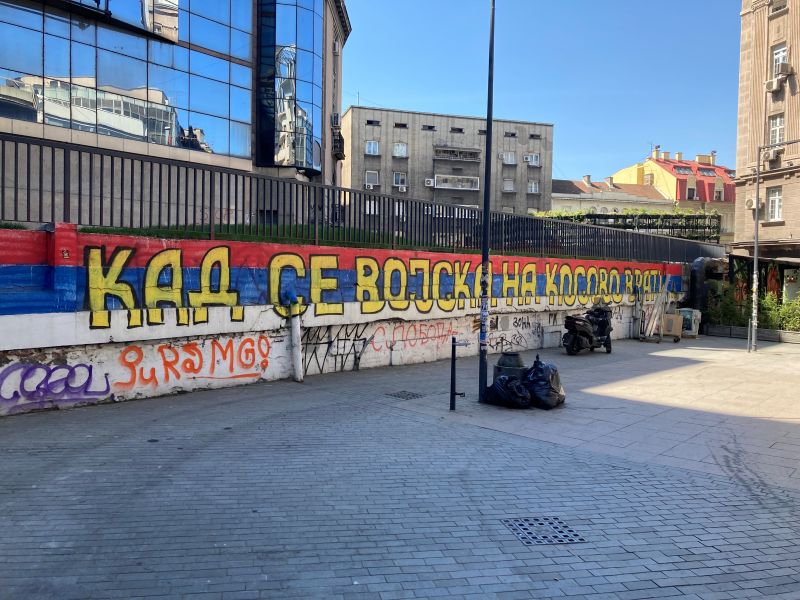Banners Over Belgrade
Jamie Maxwell travels across Europe from Helsinki to Sarajevo and reports for Bella on the simmering ethnic politics of Belgrade and Budapest. Here he examines Serbia’s nationalist/authoritarian president, Alexandar Vucic, his pro-Russian ties, and the persistence of the Kosovo question in Serbian politics.
The slogans scrawled across the streets of Belgrade do nothing to lift Serbia’s reputation as the most hostile member of the European family. ‘Death to NATO.’ ‘Death to the EU.’ ‘The only genocide in the Balkans was against the Serbs.’ This last statement is printed in large white letters above an abandoned shopfront in the centre of the city – for the tourists to see, presumably – near the National Museum of Serbia on Republic Square.


Twenty minutes east of Republic Square stands the still-crumbling headquarters of Radio-Television Serbia (RTS). At 2:06 am on 23 April 1999, the RTS building was struck by a NATO missile – part of a midnight blitz that killed 16 civilians, all employees of the Serbian state broadcaster. NATO justified its attack on the grounds that Serbian forces were ethnically cleansing Kosovo at the time and had to be stopped. Serbia, together with several human rights organisations, said the assault – on a media target, not a military one – constituted a war crime. Either way, a quarter of a century later, the charred RTS edifice remains, a morbid reminder of Serbia’s pariah status in European affairs.


‘Death to Nato’
In Belgrade, signs of Serbia’s Slavic connection to Russia are everywhere. On Kralja Milana Avenue, a 12-foot statue of Tsar Nicholas II stares out at City Hall. Beneath the statue, someone has placed a straw wreath wrapped in a Russian sash. A mile or so to the south lies the Church of Saint Sava, one of the largest Christian Orthodox structures anywhere in the world. Vladimir Putin laid an interior mosaic stone here in 2019. Russia’s state-owned energy company, Gazprom, subsequently helped finance the mosaic’s recladding.
Under the populist rule of President Alexandar Vucic, Serbia has kept its ties to the Kremlin tight, but not too tight. Vucic hasn’t endorsed Russia’s war in Ukraine, nor has he criticised it. In principle, he supports Serbia’s entry into the European Union. In practice, he does little to advance the accession process. Vucic’s twin-track strategy has created some awkward diplomatic situations. On 25 February, at the UN General Assembly in New York, Serbia’s delegation voted in favour of a European resolution that characterised Russia as an aggressor state. Vucic immediately apologised. The vote was a mistake, he said, attributable to the delegation’s exhaustion; Serbia had meant to abstain. On 9 May, Vucic attended Putin’s lavish World War Two Victory Day parade in Moscow – despite pressure from Brussels.
Watchers of politics in the Western Balkans describe Vucic as Janus-faced, his dual stance reminiscent of Tito’s non-alignment doctrine during the Cold War. Vucic certainly likes to split the geopolitical difference. From the west, he wants access to the putative economic benefits of European integration: EU structural funds, the Single Market, possibly the Eurozone. From the east – China and the Gulf states as well as Russia – he wants investment: cheap energy, cheap loans, cash for urban regeneration.
Vucic’s domestic critics, of which there are many, accuse him of being a bully and a strongman in the style of Hungary’s Victor Orban. I spent a few days in Budapest before travelling to Belgrade and the comparison does not seem unwarranted. As prime minister over the past 15 years, Orban has centralised the Hungarian political system, sacked dissenting judges, muzzled universities, and intensified censorship of the press. He has also erected posters across Budapest railing against the European consensus on Ukraine. ‘Don’t Let Them Decide For You’, the posters read, alongside menacing portraits of Volodymyr Zelenskyy, European Commission president Ursula von der Leyen, and Manfred Weber, the leader of the centre-right European People’s Party in the European parliament.


Budapest poster: ‘Don’t Let Them Decide For You’
Vucic’s approach to Serbian civil society is decidedly Orbanesque. In 2020, he oversaw a violent crackdown against a series of Covid-related street protests. In 2023, his party, the Serbian Progressive Party (SNS), prevailed in an election marked by widespread voting irregularities. Vucic focuses his authoritarian energy on the media. In the Spring, a group of senior Serbian editors published an open letter warning that press freedom in the country had reached a “dangerous turning point.” Increasingly, the letter said, journalists in Serbia face “harassment, physical attacks, and smear campaigns” for reporting on issues linked to government cost-cutting and malfeasance. According to the NGO Reporters Without Borders, the culture of media censorship in Serbia is as bad now as it was in the 1990s, when the Balkan Wars flared following the collapse of Yugoslavia. Vucic’s career began on the far-right of Serbian politics during that period. “For every Serb killed, we will kill 100 Muslims,” he remarked after the Srebrenica massacre in the Summer of 1995. Between 1998 and 2000, Vucic served as Minister of Information in the militarised regime of Slobodan Milosevic. In 2008, he co-founded the SNS, a nominally centrist – really, neoliberal – new electoral vehicle. By 2014, Vucic had become Prime Minister. By 2017, he was president.
Vucic is 6 foot 6 and speaks three languages: Serbo-Croat, Russian, and English. His grandparents were expelled from Bosnia during World War Two by a Croatian fascist militia, the Ustaše. He lived in England for a while in his youth. As president, Vucic has delivered high rates of economic growth. But healthy GDP figures have not insulated him from rising public anger over the feeble state of Serbia’s infrastructure or dimmed the perception that, during his tenure, Serbia has become more and more corrupt.
Outrage exploded late last year after the roof of a railway station in the city of Novi Sad, 60 miles north of Belgrade, collapsed, claiming the lives of 16 commuters. The roof had recently been renovated with cash from China’s Belt and Road initiative. On 15 March, half a million Serbs, led largely by students, converged on downtown Belgrade to vent their fury at the institutional failings – the graft and incompetence – they believe led to the Novi Sad disaster. Vucic responded with insults – the demonstrators were “blackmailers” determined to “pave a horrible” path for the country, he said – and by calling a demonstration of his own. Two months on, the people of Serbia remain split, literally, into pro and anti-Vucic camps.
One morning, in the heavy Balkan heat, I walked up from my hotel to a pro-Vucic encampment; a ragtag gathering of tents and tables in a small park near the Serbian National Assembly. The park had been partially fenced off by the authorities. Its inhabitants sat outside drinking, smoking, and looking sleep-deprived in the sun. I gestured to some of them but none wanted to talk – in English, at least, or to a foreign journalist – so I completed a loop of the park and walked back through the central boulevards of Belgrade.
Later, over a Coke in an air-conditioned bar, I read that the sit-in had been organised by Students 2.0, a youth movement allied to the SNS. The leader of Students 2.0 is Milos Pavlovic, an activist who has appeared alongside Vucic on pro-government propaganda sites. The suspicion among anti-corruption campaigners is that Vucic set the encampment up to burnish his grassroots credentials. The whole thing was orchestrated from “within the ruling regime,” Jelena Kleut, a philosophy professor at the University of Novi Sad, told Deutsche Welle in March. Kleut’s theory is plausible. The more time Vucic has spent in office, the more belligerent he has become. There were even reports of a sonic weapon being used by the security services against the 15 March crowd.
Brussels does not seem overly troubled by Vucic’s autocratic tendencies. Why should it be? What the EU really wants is for Serbia to act as a bulwark against Russian power in the Balkans. Indeed, it has been courting Vucic to that effect for years. On 25 March, ten days after the massive Belgrade protest, Vucic met von der Leyen and her colleague Antonio Costa, President of the European Council, for dinner in the Belgian capital. The dinner was “cordial, concrete, responsible, and serious,” Vucic said. “Serbia’s future lies in the EU,” von der Leyen wrote on X.
That assessment is optimistic. There is nothing inevitable about a Serbian pivot to the West. On this issue, if on no other, Serbian voters are less conflicted than their president. 63 per cent of Serbs believe the country will never gain entry to the EU; 76 per cent hold an unfavourable view of NATO. Moreover, in order to meet the EU’s accession criteria, Serbia would first have to normalise relations with Kosovo – and there is little chance of that happening anytime soon.
Kosovo remains a persistent source of angst in Serbian national life. Many Serbs still view the Muslim-majority enclave, independent since 2008, as theirs by right, culturally, politically, and historically. In September 2023, Serbian militants raided a small village in the north of the region. The raid ended in an armed standoff at an Orthodox Church and the killing, by gunfire, of a Kosovan policeman. Six months later, at the UN, Vucic accused the government in Pristina of backsliding into “mono-ethnic despotism.” Naturally, Russia – the self-appointed guardian of the Slavic world – refuses to acknowledge Kosovo’s autonomy. During his visit to Moscow in May, Vucic thanked Putin for supporting Serbia’s “territorial integrity.” Putin reciprocated. “We appreciate Serbia’s independent, sovereign line in international affairs,” he said.


Nationalist habits die hard. In a taxi crossing the Sava River, en route to Belgrade bus station, I passed another piece of political graffiti – bright yellow paint brushed against the red, white, and blue of the Serbian national banner. “када се војска на косово врати,” it read. I punched the Cyrillic symbols into my phone. “When the army returns to Kosovo.”

Interesting, Jamie, to get your feel on the ground in Belgrade, but Chomsky on the break-up of Yugoslavia is indisensable, a truly independent, multi-ethnic State which worked, and which the neo-liberal West preferred to see disintegrate than hang together…
The NATO bombing of Belgrade is one of the most shameful acts of our time in Europe, and you fail to make any mention of the fact that Kosovo, a non-country carved out by the Americans for their own ends with some of the worst corruption in the world, is home to the biggest US military base in the region, and its cities are full of names like George W Bush Avenue, and Maedlaine Albright square…
https://en.wikipedia.org/wiki/Camp_Bondsteel#:~:text=Camp%20Bondsteel%20is%20the%20operation,a%20Medal%20of%20Honor%20recipient.&text=The%20camp%20occupies%20955%20acres,8.2%20ft)%20high%20earthen%20wall.
Many of the leading US officials who led the war against Serbia now have business interests in Kosovo, quelle surprise, like Wesley Clarke…
https://www.occrp.org/en/news/kosovo-company-linked-to-wesley-clark-granted-coal-rights
It’s hard not to feel some symathy with the Serbs and nostalgia for Yugoslavia…
It will be difficult to find Slovenes, Kosovars and Croats who find the same enthusiasm for the old Yugoslavia. There is a limit to the amount of Yugo nostalgia that can be made credible.
But indeed granted it’s not a great moment in the history of diplomacy.
My hairdresser in Spain, Irena, is a larger-than-life Serb who claims both her parents, who died from cancer, were the victims of NATO’s uranium tipped missiles wreaking death and destruction on Belgrade…
Whether it’s true or not is beside the point, the idea that it is acceptable to bomb a city like Belgrade is absolutely outrageous (or Baghdad, or any city). One day, people will look back at the West’s trail of death and destruction from the air and describe it for what it is: barbarism…
Sven Lindqvist wrote a book called “A History of Bombing”, in which he charts the use of airwar from the first explosive devices dropped from Italian airplanes on Libya at the beginning ot the 20th Century, to Britains’s pioneering use of zonal bombing at night during WWII leading to the obliteration of Dresden and Hamburg and Nuremberg, to the Americans turning Tokyo into a ball of fire in 1944, and subsequently dropping more explosives on Vietnam than any other country in world history, though in terms of kilos of explosives per square kilometer, Gaza is now the most bombed country in history, or so I understand…
He ends with Hiroshima and Nagasaki, and points out that the nuclear warheads of our time contain as many as 500 Hiroshimas, so that even one nuclear missile would lead to the death of millions and millions of people…
The idea the Americans intervened to create Kosovo to save Muslim lives is belied by their indifference and indeed eager participation in the crimes of Israel in Gaza, where Palestinian lives do not count for anything. Kosovo was only ever about US military / geopolitical interests…
If I were a Serb, I would certainly be reluctant to join NATO and the EU, naturally…
PS Irena, a Serb with big hands and a big heart, and an excellent hairdresser, so long as you can keep her off the NATO bombing of Belgrade, because she goes off on one, there is no stopping her, and she just talks and talks and talks, and cuts away at your hair as she does so, and goes too far with it, so that you end up in a kind of trance in the barber’s chair, listening to her and the scissors snip, snip, snipping away…
You kind of let yourself go as Irena cuts your hair down to the roots, way more than you wanted, and tells you about her dead parents and the uranoum tipped NATO shells which gave them cancer, for sure, and her exhusband who went mad and became an alcoholic and a wretch because of the war…
I havent seen Irena in some time, she was always changing salons, she would be too much for most every day of the week, what we used to call a character, but she was obsessed by the NATO bombing of Belgrade, and probably that is not uncommon among Serbs…
I am interested did you ever enquire with Irene her thoughts on the Srebtenica massacre ie killing of 8000 Bosnian (Bosnian Muslims) men and boys as well as the mass expulsion of another 25-30,000 Bosnians by VRI under command of General Ratko Miladic?
Hi John,
No, I never asked her about the massacre of Srebrenica, not wanting to risk getting a pair of scissors thrust casually into my neck, nor did I ask her about the NATO bombing of Belgrade I should say, she would veer that way eventually, no matter the topic of conversation. But she had quite a following in the neighbour, she was / is an excellent hairdresser, a warm and what you might call bubbly character, always quick with a funny line or a joke, married to a self-effacing, mild mannered Spaniard whom I met once in her shop, her third husband, after the first one who went mad and the second one, an Israeli, she had lived in Israel for a few years and pooh-poohed it too….
Good to have this thoughtful review.
IMO, Slavs should have their own Union
They’re no more European than the Russians
But certainly different from Western Europeans
The EU’s objectives there, and including Ukraine.
are. like Jamie says, clearly geopolitical.
And with what’s going down at the moment
Brussels seems to be more of a threat to us all
than Russia, China or even aliens
Happy for you to discuss your forceful opinions with Ukrainian family who stayed with us after being bombed out of their flat.
PS – I am also very unhappy that the same assistance was not afforded to Palestinian civilians.